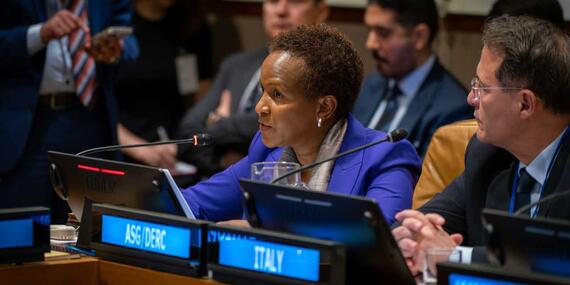Deputy relief chief: Urgent support needed for Horn of Africa's people

Remarks by Assistant Secretary-General for Humanitarian Affairs and Deputy Emergency Relief Coordinator Joyce Msuya at the
Horn of Africa Pledging Conference 2023:
Excellencies, Secretary-General, ladies and gentlemen, colleagues,
On behalf of the UN Office for the Coordination of Humanitarian Affairs, the Inter-Agency Standing Committee, and the entire humanitarian community, I would like to thank Italy, the United Kingdom, the United States and Qatar for joining the United Nations in convening this event, in collaboration with the Governments of Ethiopia, Kenya and Somalia. And I would like to thank all of you for joining us today.
The people and the countries of the Horn of Africa have faced a monumental set of challenges that would test any country or region to the limit. Five consecutive poor rainy seasons caused one of the worst droughts in recent history.
Conflict and insecurity, massive displacement, and high food prices caused by global economic shocks, deepened the crisis and have left millions facing acute levels of food insecurity, malnutrition and hardship.
In 2022, thanks to your solidarity and the efforts of local communities, humanitarian organizations, and national authorities, famine was prevented, and more than 30 million people were provided with life-saving and life-sustaining aid. But the humanitarian emergency is not over.
This year, while improved rains have started to ease the impacts of drought, they have also brought a new set of risks and challenges, including disease outbreaks.
The compound effects of years of crisis mean that over 43 million people need humanitarian assistance. This includes over 32 million people facing high levels of acute food insecurity. And, more than 8 million children, and pregnant and lactating women, facing acute malnutrition this year.
The humanitarian community is determined to provide the support that people need. But five months into the year, funding is critically short.
Cash-based food assistance – the predominant modality for food aid – has fallen off dramatically. And our humanitarian partners are already running out of money, with many facing the possibility of having to suspend, scale back or shut down programmes.
I would like to sincerely thank all of you who have so far contributed to the 2023 Humanitarian Response Plans for Ethiopia, Kenya and Somalia, and to those of you who have come today ready to pledge further support. Your generosity is truly making a difference.
But I am also issuing an urgent call for more donors to come forward to fund the US$7 billion needed to provide lifesaving and life-sustaining assistance in the region. And, to help with the additional $833 million required to assist more than 1.6 million refugees and host communities in Ethiopia, and the $16.1 million required to respond to the needs of migrants in Somalia.
People in the Horn of Africa are on the front line of the climate emergency.
So, we also need to invest in long-term solutions, to help the countries of the region recover, and adapt to the new realities caused by human-induced climate change that they did so little to create.
And we must take more resolute steps to address the climate crisis, now.
Thank you.
